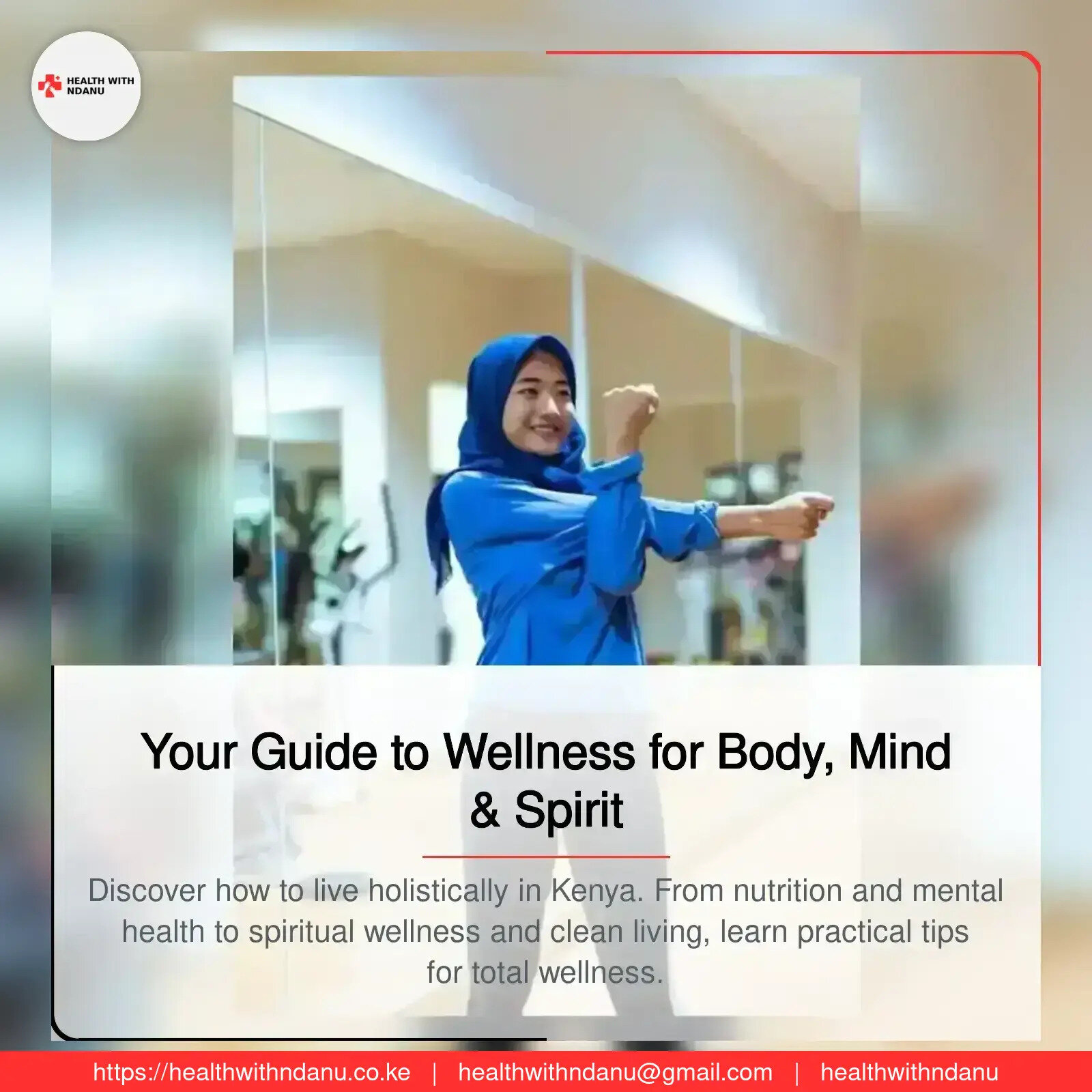Your Guide to Wellness for Body, Mind & Spirit
- by Diana Ndanu
- 12 April, 2025
- 0 Comments
- 5 Mins



Introduction
What is Holistic Health?
Holistic health is more than just a wellness trend—it's a lifestyle. It means taking care of the whole person: body, mind, spirit, and environment. In Kenya and across Africa, where both modern and traditional healing practices intersect, holistic health provides a grounded and culturally relevant way to live better.
In this article, we’ll explore what holistic health is, why it matters, and most importantly, how to start living holistically. Whether you're a student, a parent, a professional, or a community health promoter, this guide will help you take practical steps toward a healthier life.
Why Holistic Health Matters in Kenya and Africa
1. Chronic Illnesses Are Rising Diseases like diabetes, hypertension, obesity, and cancer are on the rise. Many of these are lifestyle-related and can be prevented or managed through a holistic approach that includes proper diet, stress reduction, and regular physical activity.
2. Mental Health Awareness is Growing, Mental health has long been a taboo in many African communities. Holistic health encourages open conversations, stress management, mindfulness, and therapy, all of which are crucial in addressing mental wellness.
3. Cultural Synergy Africa has a rich tradition of using herbs, spiritual practices, and community-based healing. Holistic health doesn’t replace traditional methods—it complements them. For instance, traditional herbal medicine can work well with dietary changes and counseling.
4. The Environment is Part of Our Health Living holistically also means caring for the environment. In rural Kenya, polluted water or soil can cause health issues. Holistic living encourages clean water use, organic farming, and reducing harmful waste.
How to Start Living Holistically: A Step-by-Step Guide
1. Focus on Nutrition
- Eat whole, local, and seasonal foods.
- Avoid processed foods high in sugar and trans fats.
- Include a variety of fruits, vegetables, legumes, and whole grains.
- Drink plenty of clean water daily.
- Practice mindful eating—don’t just eat to fill your stomach; eat to nourish your body.
2. Move Your Body Every Day
- You don’t need a gym—walk, dance, or do chores actively.
- Try yoga or stretching to improve flexibility.
- Exercise helps not just your body, but also improves mental clarity and mood.
3. Sleep is Medicine
- Get 7–9 hours of quality sleep.
- Avoid screens before bedtime.
- Use relaxing nighttime routines like herbal tea or reading.
4. Manage Stress Naturally
- Practice deep breathing, journaling, or prayer.
- Spend time in nature, under trees or near water.
- Laugh more—watch something funny or connect with joyful friends.
- Reduce toxic relationships that drain your energy.
5. Spiritual Wellness
- Reflect regularly—through prayer, meditation, or quiet time.
- Read spiritual or uplifting books.
- Attend community worship or fellowship gatherings.
6. Prioritize Mental Health
- Speak to a counselor, therapist, or trusted mentor when overwhelmed.
- Don’t ignore signs of stress, anxiety, or depression.
- Practice self-compassion.
7. Clean Living Environment
- Keep your home clean and clutter-free.
- Use natural products to clean and freshen your home.
- Grow plants—they purify the air and lift your mood.
8. Limit Toxins
- Avoid smoking and excessive alcohol.
- Reduce exposure to harmful chemicals in food, water, and products.
- Choose natural or organic alternatives whenever possible.
9. Build Supportive Relationships
- Connect with people who uplift and inspire you.
- Be honest and open in communication.
- Join community groups or support networks.
10. Lifelong Learning
- Stay curious about your health.
- Read books, listen to podcasts, attend workshops.
- Ask questions and explore your body’s needs.
How Communities Can Encourage Holistic Health
1. Support Local Farmers – Encourage markets that sell organic and pesticide-free produce.
2. Build Wellness Centers – Create spaces for yoga, meditation, and mental health support.
3. Encourage Traditional Healing Practices – In safe, evidence-informed ways, blend them with modern knowledge.
4. Promote Clean Environments – Through waste management, tree planting, and water protection.
Challenges of Holistic Living in Kenya
- Access to clean food and water: In many areas, nutritious food and clean water are scarce.
- Cultural Beliefs: Some communities still attach stigma to mental health or alternative healing.
- Cost: Organic products and natural therapies can be expensive.
- Lack of Education: People may not know where or how to start.
- But the good news is: holistic health doesn’t have to be expensive.
It’s about being intentional with your choices. Choosing githeri instead of chips, taking a walk instead of watching TV all evening, or spending time journaling instead of scrolling online.
Real Stories: How Holistic Living Changed Lives in Kenya
- Mama Wanjiru from Kiambu switched from soda and mandazi to porridge and fruits. Her energy levels went up, and her blood sugar stabilized.
- David from Kisumu started a small backyard garden. Growing his own sukuma and kunde not only gave him fresh food but also reduced stress.
- Grace from Mombasa began journaling and meditating. She says it helped her cope with grief and brought inner peace.
Their stories are proof that simple changes lead to big transformations.
Your Holistic Health Checklist
- Eat balanced meals
- Drink clean water
- Get enough sleep
- Move your body daily
- Practice mindfulness/spirituality
- Seek help when needed
- Avoid toxins (emotional and physical)
- Stay connected with supportive people
- Keep learning about your health
Conclusion: Your Journey Starts Now
Holistic living is not about being perfect—it’s about progress. It’s about choosing balance, wellness, and joy in all areas of life.
Whether you live in Nairobi, Eldoret, Turkana, or Ukambani, you can take steps toward a healthier, more meaningful life. Let’s build a Kenya—and Africa—where wellness is for everyone.
Are you ready to begin?
Got Your Own Experience? Share with us
Kategoria Maarufu
Blogu Zinazotembelewa Zaidi
Daily Newsletter
Get all the top stories from Blogs to keep track.



